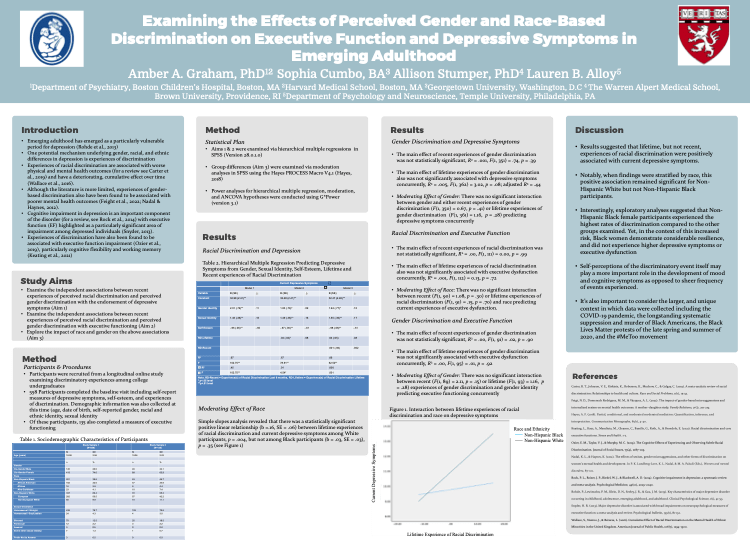Scientific Abstract
Background: Discrimination is a potential mechanism underlying gender, racial, and ethnic differences in depression and executive function. The current study sought to examine the effects of race-based and gender-based experiences of discrimination on executive function and depression separately, and to fully elucidate the impact of race and gender on these associations.
Methods: 558 participants (Mage=18.98 years, 74% female, 60.4% Non-Hispanic White) completed measures of discrimination and depression as part of longitudinal study examining discrimination in emerging adulthood. Of these participants, 135 also completed a measure of executive functioning (Mage=9.06 years, 65.9% female, 55.3% Non-Hispanic White). Participants were classified into one of four categories based on self-report: Non-Hispanic Black Male, Non-Hispanic Black Female, Non-Hispanic White Male or Non-Hispanic White Female. Associations between discrimination and either depression or executive functioning were examined via hierarchical multiple regressions in SPSS. Group differences were examined via moderation analyses using the Hayes PROCESS Marco.
Results: Lifetime (F(1, 380)=4.52, p=.03) but not recent experiences of racial discrimination (F(1, 373)=.001, p=.98)were significantly associated with current depressive symptoms. Further, among White, but not Black participants, lifetime experiences of racial discrimination were associated with higher levels of current depressive symptoms. There was no significant association between experiences of gender discrimination and current depressive symptoms, or experiences of either racial or gender discrimination and executive functioning (all ps>.05).
Conclusions: Results suggest that among emerging adults, experiences of racial discrimination constitute a salient risk factor for depressive symptoms, as opposed to experiences of discrimination more broadly. Further, day to day executive functioning may be more resilient to experiences of discrimination than previously suggested by the literature.
Search posters

